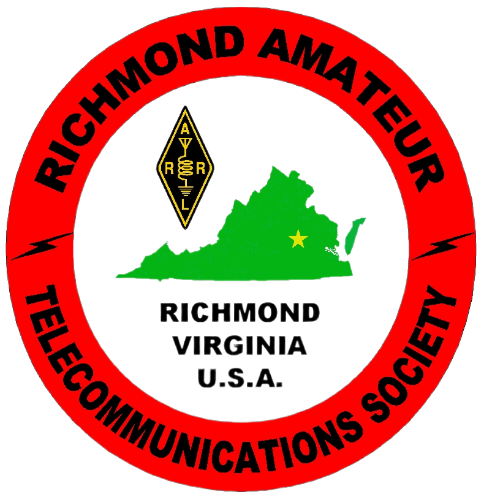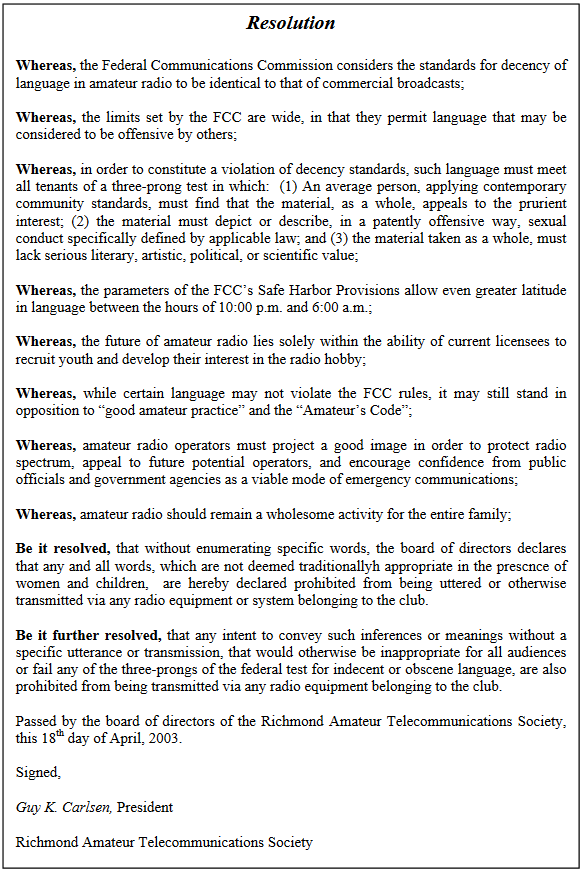|
RATS Repeater System Rules
RATS and our Technical Committee work hard to provide a quality repeater system for our members and the agencies who rely on our infrastructure. In the spirit of open access, RATS welcomes all properly licensed amateurs wishing to use our systems, provided the following guidelines are followed.
All Systems - All Users
- All users must operate in a manner compliant with FCC Part 97 at all times.
- Share the resource. Leave an adequate space (a few seconds) between each transmission to allow enough time for another station to break in. Someone may have an emergency or may want to join the conversation. Take breaks in longer conversations and invite other stations to join or use the repeater.
- Identify your transmissions. "Kerchunking" (pushing the PTT button simply to activate the repeater without intent to speak) is not permitted on our repeaters. In addition to being a nuisance to other users of the system, we consider these to be unidentified transmissions, and thus prohibited under Part 97. If you want to test your ability to reach the repeater, simply announce your call sign and "testing."
- RATS has a Memorandum of Understanding (MOU) with some organizations for priority access to the repeater during emergencies or for special events. While nets are in progress, all transmissions shall be at the direction of that agency's net control operator.
- Any user needing emergency assistance or needing to relay emergency traffic during an active conversation, announce "BREAK" or "EMERGENCY" and all other users will yield to the emergency traffic. Please do not use the word "BREAK" to interrupt a conversation on any repeater, anytime, anywhere, unless you have an emergency. If you wish to join a conversation, simply announce your call sign in between transmissions. [More Info]
- Please turn off any unnecessary beeps, boops, and other sound effects such as the "roger beep" function commonly found on many lower-cost radios.
- All transmissions must be in English. (The FCC doesn't require English for anything other than station identification, but since our control operators are responsible for what goes out over the air through our repeater, we need to know that it's legal. English is currently the language which is most compatible with our aging fleet of control operators.)
We highly recommend giving this repeater etiquette guide a read.
RATS has always been pretty open-minded about the use of the repeaters. We prefer users shy away from controversial topics -- politics in particular. (We can recommend a couple of popular HF frequencies if you'd like to stir a pot.) Otherwise, keep the language appropriate, be mindful of others, and share the airspace.
If you or your organization wish to use the repeater for a net, special event, or other activity please contact the Board and/or trustee. This helps us avoid scheduling maintenance on top of your event, and also allows us to keep you up to date on any system performance issues that might impact your activities.
Like your amateur license, use of the RATS repeater systems is a privilege, not a right. The RATS Board, trustee, and control operators may prohibit any station from using the repeaters or other club systems at any time. Illegal, inappropriate, abusive, or discourteous behavior will not be tolerated.
C4FM / WIRES-X Repeater Users
- If you have connected the repeater to a WIRES-X room or node, please disconnect when you are finished. This will restore the repeater's normal connection to the Virginia Room.
- The RATS WIRES-X system is not intended for extended monitoring of remote WIRES-X rooms/nodes. If you wish to lurk on a high traffic national or global WIRES-X room for more than a few minutes, please consider the use of a personal hotspot device.
- Your radio must transmit a valid call sign corresponding to the current operator. Unidentified or improperly identified radios will be blocked. If you believe your radio may have been blocked please contact the RATS Technical Committee for assistance after confirming your radio is configured properly.
DMR Users
Additional operating guidelines and etiquette apply to the use of the DMR system.
- When activating a dynamic talk group, kerchunk the repeater to establish the link, then wait before making your call.
- Use the "Clear Time Slot" function on time slot 2 to drop on-demand talk groups when you're finished using them.
- Radios must transmit a valid DMR radio ID. Blank or invalid radio IDs may be blocked from accessing the system.
- Use time slot 1 for all text messaging, private/radio-to-radio calls, and IP data. IP data use requires advance approval by the RATS repeater trustee. Group text messages are not permitted to talk groups that appear on the DMRVA talkgroup matrix.
- Use of All Call is limited to: W4RAT Control Operators, DMRVA network administrators, Wakefield SKYWARN Net Controls, and true emergency traffic. Non-emergency activation of All Call by unauthorized users may result in a loss of repeater access privileges. Do not test your All Call on the repeater. If you have an emergency and need immediate life-saving assistance you may use All Call on either time slot in order to receive or render aid. Make your initial call over All Call and then switch to Local/Metro. When you use All Call, you are forcing your audio (and usually some alert tones for extra attention) out of every radio on the time slot whether the user wants to hear from you or not, including those that are idling on "Quiet" channels at o'dark:30. Please do not abuse this feature.
- Use of TX Interrupt is limited to W4RAT Control Operators and DMRVA network administrators. Users are encouraged to configure their channels to allow TX interruption where supported by their equipment.
- Reminder: Unlike some digital modes, your DMR radio ID by itself does not satisfy identification requirements of Part 97. You must identify your transmissions by voice as you would on any analog system.
2003 Board Resolution
The list of repeater operating guidelines above was initially published in 2019. It has been modified a few times to account for new technologies, new problems, and new ways of doing things. But RATS has a long history of holding itself and its members to a high standard when it comes to professionalism on the air. Back in April 2003, the RATS Board of Directors passed a resolution establishing that certain types of language and content were not welcome on the club's systems. Click on the image at the left to view that resolution. From the Summer 2003 RATS Solid Copy newsletter, emphasis added:
During the April meeting Parke Slater, N4KFT, and Dave Kiefer, N4DWK, gave a presentation about VHF and UHF communications, particularly when it comes to repeater usage.
Etiquette and repeater protocols were described. Also things not to do were presented in the form of “How to be a Lid.” This was an informative and entertaining challenge for each of us to always be on our best behavior when we’re on the repeater and show whomever may be listening that, though we’re amateurs, there’s nothing amateurish about us.
Toward this end, the board of directors passed a resolution in April regarding conduct on the club’s repeaters and any other equipment owned by the club. This resolution was presented to the membership during April’s meeting and is reproduced [here].
We have no records indicating this April 2003 Board Resolution has ever been repealed by the Board of Directors, so it's still in effect today and serves as a foundation for the modern operating guidelines provided on this page.

